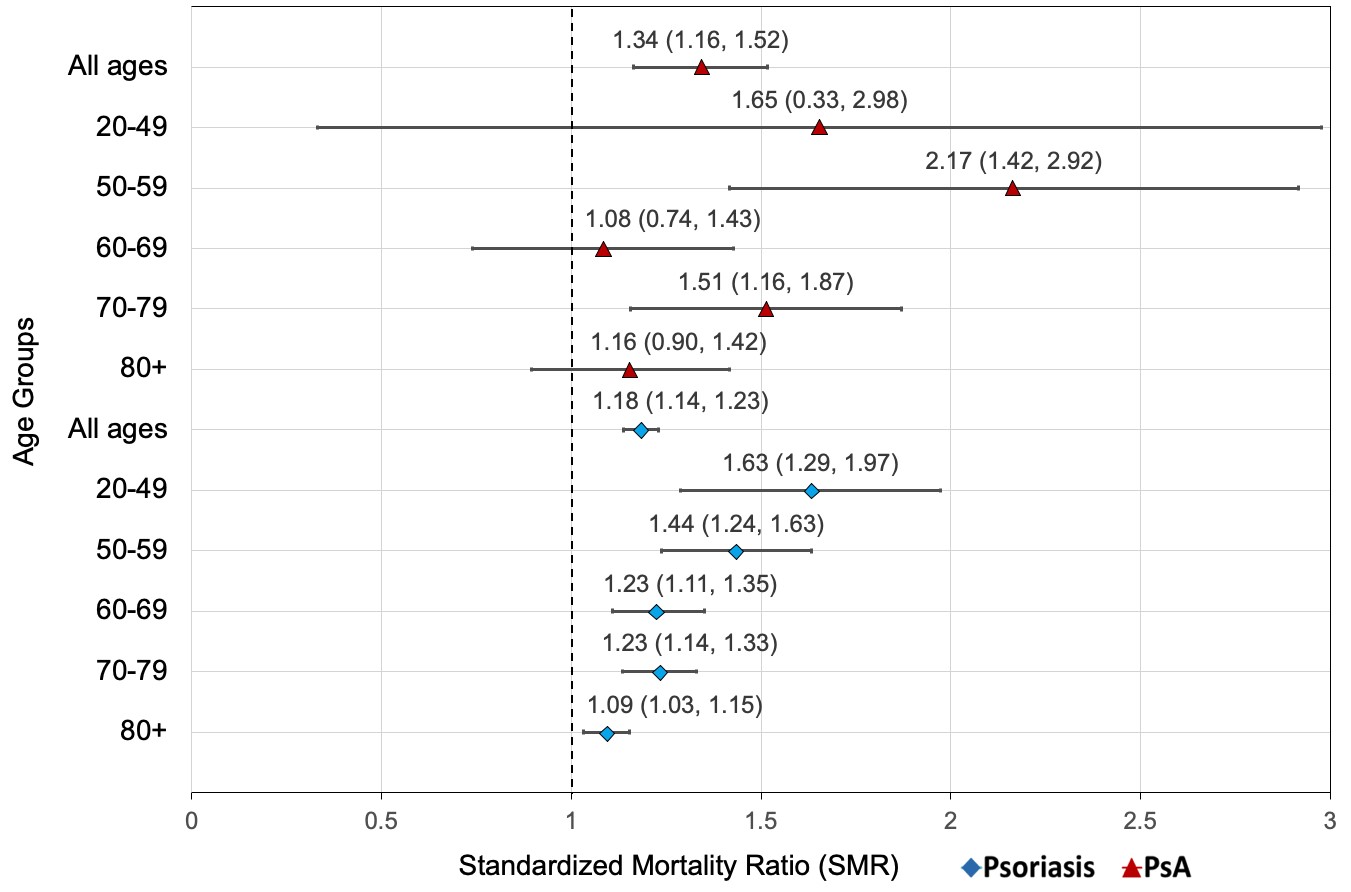Session Information
Date: Sunday, November 8, 2020
Title: Epidemiology & Public Health III: Risk Factors & Outcomes (1472–1476)
Session Type: Abstract Session
Session Time: 5:00PM-5:50PM
Background/Purpose: Several studies have consistently demonstrated that psoriasis is associated with an increased risk of mortality compared to the general population. However, the excess risk of mortality in psoriatic arthritis (PsA) is unclear, with observational studies yielding conflicting evidence. We aimed to compare overall and cause-specific mortality rates and their trends over time among patients with psoriasis, PsA and general population comparators without psoriatic disease living in Ontario, Canada.
Methods: We performed a population-based study using health administrative data among adult Ontario residents between 1996 and 2016. Patients diagnosed with psoriasis (from 1996 onward) and PsA (from 2008 onward) were identified using validated case definitions and compared with individuals without psoriatic disease. All-cause and cause-specific age- and sex-standardized mortality rates, standardized mortality ratios (SMRs) and excess mortality rates were computed for the years 1996 to 2016.
Results: A total of 176,858 psoriasis patients (2,524 deaths) and 15,430 PsA patients (221 deaths) were identified in 2016. All-cause mortality rates were greater among patients with psoriasis and PsA compared with the general population. The standardized mortality rate per 1000 (95% confidence interval [CI]) in 2016 was 8.26 (7.92, 8.62) among those with psoriasis and 9.25 (7.97, 10.69) among those with PsA compared to 6.82 (6.78, 6.86) in the general population. Patients with psoriasis and PsA had excess mortality rates of 5.70 (95% CI 5.20, 6.21) and 5.75 (95% CI 3.98, 7.71) per 1000 population, respectively. All-cause SMRs in 2016 were elevated for psoriasis: 1.18 (95% CI 1.13, 1.23); and PsA: 1.34 (95% CI 1.16, 1.52) (Figure 1). Standardized mortality rates decreased by approximately 30% over the study period in both disease groups, but remained elevated compared to the general population (Figure 2).
The leading causes of death and corresponding SMRs in psoriasis patients were cancer (26.0%, SMR 1.11), circulatory diseases (25.6%, SMR 1.12), and respiratory conditions (11.7%, SMR 1.32) (Figure 3). In those with PsA, circulatory disease (26.2%, SMR 1.35) was the leading cause of death, followed by cancer (21.7%, SMR 0.96), and respiratory conditions (12.7%, SMR 1.69).
Conclusion: This study, the largest one to date that assessed trends in mortality rates and their underlying causes, showed that mortality rates in psoriasis and PsA have decreased over the past decade, but remain significantly elevated compared to the general population. Cardiovascular diseases, cancer and respiratory diseases remain the leading causes of mortality in psoriasis and PsA.
 Figure 1. Age-specific Standardized Mortality Ratios (with 95% CI) in psoriatic arthritis (PsA) and psoriasis patients (2016).
Figure 1. Age-specific Standardized Mortality Ratios (with 95% CI) in psoriatic arthritis (PsA) and psoriasis patients (2016).
 Figure 2. Annual age- and sex-standardized all-cause mortality rates among patients with psoriatic arthritis (PsA), psoriasis, and general population comparators (with 95% CI) from 1996 to 2016.
Figure 2. Annual age- and sex-standardized all-cause mortality rates among patients with psoriatic arthritis (PsA), psoriasis, and general population comparators (with 95% CI) from 1996 to 2016.
 Figure 3. Standardized Mortality Ratios (with 95% CI) for the five leading causes of death in individuals with psoriatic arthritis (PsA) (top plot) and psoriasis (bottom plot) (2016). Causes of death are listed by chapter of the International Classification of Diseases, Tenth Revision.
Figure 3. Standardized Mortality Ratios (with 95% CI) for the five leading causes of death in individuals with psoriatic arthritis (PsA) (top plot) and psoriasis (bottom plot) (2016). Causes of death are listed by chapter of the International Classification of Diseases, Tenth Revision.
To cite this abstract in AMA style:
Colaco K, Widdifield J, Luo J, Rosen C, Alhusayen R, Paterson J, Campbell W, Tu K, Bernatsky S, Gladman D, Eder L. Trends in Mortality and Cause-specific Mortality Among Patients with Psoriasis and Psoriatic Arthritis in Ontario, Canada [abstract]. Arthritis Rheumatol. 2020; 72 (suppl 10). https://acrabstracts.org/abstract/trends-in-mortality-and-cause-specific-mortality-among-patients-with-psoriasis-and-psoriatic-arthritis-in-ontario-canada/. Accessed .« Back to ACR Convergence 2020
ACR Meeting Abstracts - https://acrabstracts.org/abstract/trends-in-mortality-and-cause-specific-mortality-among-patients-with-psoriasis-and-psoriatic-arthritis-in-ontario-canada/
